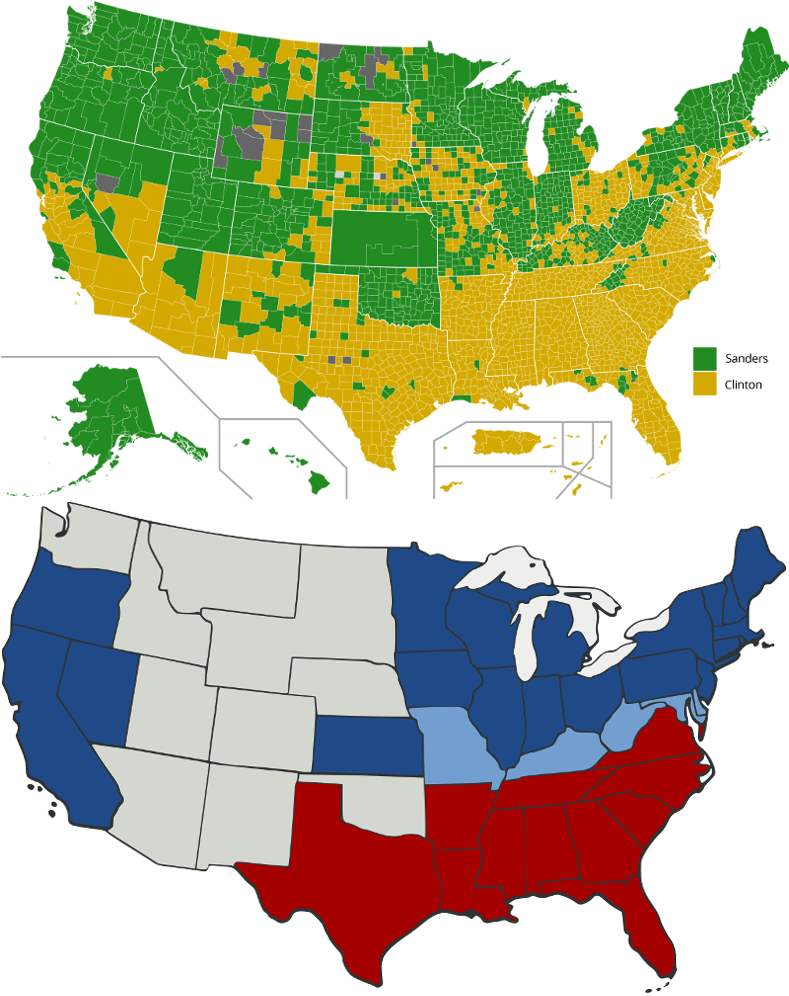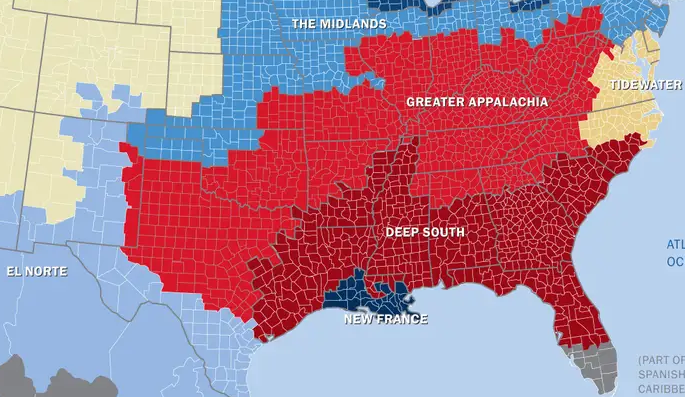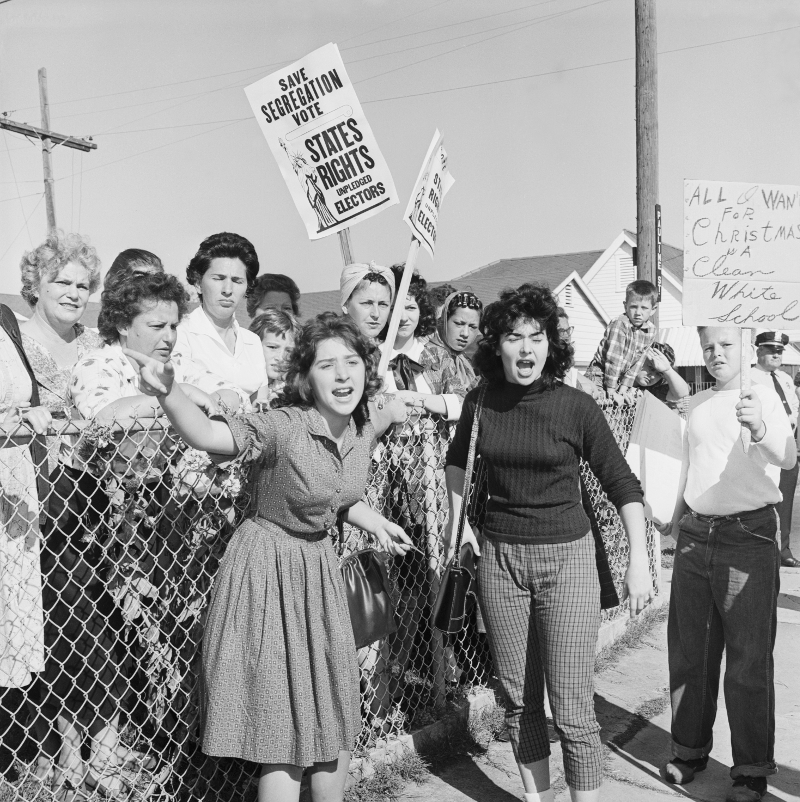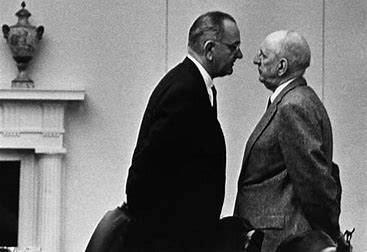From Massive to Passive: George Lewis’s Massive Resistance
Morris van de Camp2,180 words
George Lewis
Massive Resistance: The White Response to the Civil Rights Movement
London: Hodder Education, 2006
There are very few books that cover the white response to the “civil rights” movement very seriously. Professor George Lewis of the University of Leicester (UK) has done such a work. However, the book maintains the flaws of all histories of “civil rights,” which includes a lack of an overarching historical narrative, a deliberate attempt to misunderstand white advocates, a failure to even interview ordinary white segregationist protestors, and a failure to mention just how violently blacks reacted following their “civil rights” victory. At one point in the book, Professor Lewis calls the “civil rights” movement a “freedom struggle.”
Although Professor Lewis mentions the 1948 Democratic Convention which ultimately committed that party to “civil rights,” the narrative focuses on the timeframe of 1954 to 1965 — the years between Brown v. Board (1954) and the Voting Rights Act of 1965. Admittedly, these are critical years for the “civil rights” movement, but this timeframe should be understood as the time when whites started to resist at the grassroots level rather than mostly ignoring “civil rights” advances as they had been doing hitherto. The biggest strides for “civil rights” occurred with no significant white resistance from the early 1930s until Brown in 1954.

Top: The 2016 Democratic Primary results. Bottom: The Confederate States of America. The Southern Question creates a big divide in American politics. It is made far, far worse by the presence of Africans. The Negro problem isn’t one of skin color or white “bigotry”: America’s blacks, as a group, are dangerous to themselves and others. The closer whites are to large communities of blacks, the larger this fact looms in their lives.
From Passive to Massive Resistance
The term “massive resistance” originated over several days in mid-February 1956 by Senator Harry Flood Byrd of Virginia. When questioned by the press, Senator Byrd initially stated Southern resistance to the desegregation of Brown would be that of passive resistance; over time, it morphed into massive resistance. The South, Senator Byrd hoped, would resist “civil rights” as a solid block until the racial integrators gave up.
Professor Lewis goes on to explain just how difficult it turned out for the South to really unite as one block and conduct “massive resistance.” Although he doesn’t mention it directly, the South comprises four different sub-nations.

The former Confederacy comprises four different regions. I am leaving out the Spanish region of El Norte here as it was not involved in “civil rights.” In fact, its population was considered white until the US Census Bureau created the “Hispanic” category in the 1970s.
The South’s different sub-nations are best described by Colin Woodard in his 2011 book about the regions of North America. They are:
New France: This is the area of southern Louisiana. The region’s founders were French and when Louisiana was admitted to the Union it chose the Napoleonic Civil Code as its legal framework. The state is poorly governed. There are all sorts of environmental disasters, crony capitalist corruption, Huey Long-type scandals, large-scale social breakdowns, etc.
Tidewater: This is the region surrounding the Chesapeake Bay. It is the area in the US with the oldest English settlements. Most of its founding stock consists of the second sons of English knights and their servants. They see themselves as carrying on Anglo-Norman social traditions. Many of America’s senior leadership caste comes from this group to include, George Washington, Robert E. Lee, and George C. Marshall.
Greater Appalachia: The region was settled mostly by Anglo-Celtic pioneers from the English/Scottish border region and the Protestant settlers of Ulster, Ireland. The area is mostly white and mostly poor. During the Civil War, many Appalachian counties in the South counter-seceded. West Virginia is the biggest example of this. Winston County, in Alabama, also attempted to leave the Confederacy and they formed their own regiment for service in the Union Army.
The Deep South: The region starts in South Carolina and extends into eastern Texas. The founders were English plantation owners in Barbados who expanded their social and economic system to the North American mainland. This region has the highest ratio of blacks to whites.

The biggest concentration of blacks is in The Deep South, but New France and Tidewater also contain large numbers. These regions had great difficulty uniting during the latter stages of the “civil rights” conflict.
How Massive Resistance Manifested
By the 1950s, legal segregation was something like the old threshing machines that one might see rusting on the prairie of central Kansas. Like such a machine, society-wide segregation could clunk along, but only when the environment was just right. For example, segregation needed a stable demographic, roughly even numbers of blacks and whites, enough of a tax or customer base for two of everything, and public items such as bus transport commonly used by both paying customers of both races at a perfect 50/50 split. When the whites became wealthy enough to own their own cars, segregated busses became unnecessary. Everyone also needed to cooperate to make things work.
When “civil rights” activists ceased to cooperate, leveraged a sympathetic media, and gained favor with a sympathetic Judicial Branch which the NAACP had shaped since the Taft administration, legal segregation started to break apart. And it broke up along the South’s regional lines.
Those in the Deep South, in particular, resisted the longest. Their most successful organization was the Citizen’s Council. This organization mostly consisted of the upper-middle class, i.e. bankers, lawyers, small businessmen, etc. They carried out a metapolitical effort to promote their views and when they could, “deplatformed” black businessmen who supported desegregation across the small towns in the Deep South.

“The Cheerleaders” in action. The sight of older women screaming at children turned out to be terrible optics.
For a time, Virginia closed down its school system rather than integrate. In New Orleans, a group of moms nicknamed “The Cheerleaders” heckled the students integrating the elementary schools. This turned out to be off-putting to other regions of the South, not to say the rest of the country. Obviously, people in the Highland South, where there were fewer blacks, were the least supportive of shutting down schools. In states like Arkansas — which consisted of two cultural regions — the side of the state with few blacks would integrate easily and the side with more blacks would fiercely resist integration. The Southern business class eventually came to support “civil rights.” Segregation was defeated in detail.
Professor Lewis argues that the various Southern politicians resisting “civil rights” such as Senator Byrd of Virginia and Senator Richard B. Russell, Jr. of Georgia had a genuine constituency. Furthermore, white resistance evolved to be highly intelligent and extremely adaptive to changing circumstances as the “civil rights” clash continued. Indeed, Lewis argues, Senator Samuel J. Ervin, Jr. of North Carolina nearly gutted the 1964 Civil Rights Act through “careful legislative plotting” [1]. He almost got an amendment that would have restricted the use of the legal doctrine of separate sovereigns in civil rights cases. His amendment failed, and now those who committed a “civil rights” offense of some sort and were found not guilty in a local court could get tried again in a federal court.
Segregationist violence and bad optics from people like The Cheerleaders eventually tore away at the legitimacy of massive resistance. I also believe that the national shock and grief following the assassination of President Kennedy in 1963 paved the way for “civil rights” in that the issue could be framed as a martyr’s cause since President Kennedy had made some concessions to the movement. President Kennedy was also succeeded by a far more capable politician in the form of Lyndon Baines Johnson.

President Johnson giving Senator Russell “the Treatment.” LBJ was far more skilled than his predecessor at bending powerful, big-ego men to his will. President Johnson also had no moral compass. His biographer Robert Caro argued that Johnson trimmed his sails to catch whatever wind that he felt would blow him to power. In 1964, that wind appeared to be “civil rights.”
After the 1964 Civil Rights Act and the 1965 Voting Rights act were passed, the same senators who had resisted it insisted upon following these laws. “Civil rights” had won a massive social victory. By the end of the 1960s, no white could make a stand against any “civil rights” measure, no matter how rational, and maintain a respectable position in society.

Places where the 1965 Voting Rights Act Applies. Strangely, no Southern politician worked to reverse the 1964 Civil Rights Act or the 1964 Voting Rights Act even as their constituents fled their effects and cities burned to the ground. In the case of the former act, it has become something of an illicit second constitution. In the case of the latter act, the law is probably unconstitutional in that it gives the US Justice Department control over the democratic actions of various states and localities. Article IV, Section 4 of the US Constitution guarantees to every State in this Union a republican form of government.
Governor George Wallace of Alabama
Professor Lewis devotes considerable study to George Wallace of Alabama. To explain it simply, Wallace was effectively governor from 1963 until he retired in 1987 — there was a brief time where his wife, then another woman, were governor, but that situation is beyond the scope of this article. Wallace was a segregationist’s segregationist. His career was filled with a number of neo-Confederate and pro-segregation political stunts.
He was unable to stop desegregation. In the early 1960s, he was outmaneuvered by President Johnson on that count, but his career remade the political landscape. “When Wallace won Florida [in 1972],” writes Professor Lewis, “and a poll suggested that his strong showing in the Sunshine State was linked to voters’ antipathy to busing, Nixon’s White House counsel Charles Colson proclaimed it to be the ‘only issue; in the forthcoming election.” [2]

You can buy Greg Johnson’s The White Nationalist Manifesto here
After 1972, the white South was Republican territory and the GOP was a far different party than before. Politicians who’d supported the “civil rights” legislation started to fall across the South. Moderate Democrats moved to end bussing students to far off schools to achieve “civil rights” integration goals. Wallace’s career was also a successful manifestation of something that the Segregationists couldn’t manage in the late 1950s and early 1960s. That is to say, in the late 50s Segregationists tried to show Northern newspaper editors and other notables the morality of their cause. They brought Yankees down to the Delta, gave them all sorts of what we’d call today “race realist” education involving IQ, crime rates, ghettoization, social pathologies, etc. and they failed to persuade. At the end of the decade, Wallace drew crowds and voters across the North. Yankee minds, had, in fact, been changed. Though it might take some time, metapolitics works.
While Professor Lewis doesn’t mention this, it is more likely that exposure to black rioting and mayhem in the North coupled with the earlier Segregationist metapolitical efforts changed minds rather than just George Wallace’s silver-tongued oratory. Additionally, the North started to get clubbed by the 1964 Civil Rights Act, which is an illicit parallel constitution. Writes Christopher Caldwell:
“The goal of the civil rights laws, at least as they were understood by a sentimental public, was to short-circuit the sham democracies of the American South, to bring them into conformity with the Constitution. But it turned out to be harder than anticipated to distinguish between the South’s democracy and everybody else’s. If the spirit of the law was to humiliate Southern bigots, the letter of the law put the entire country — all its institutions — under the threat of lawsuits and prosecutions for discrimination.” [3]
From Massive back to Passive Resistance
“Civil rights” was more a parasitical racial power-grab than a social contract that specified the rights and duties of the citizen to his society. Hence the “civil rights” struggle rather than Civil Rights. Regardless of the semantics, as mentioned above, “civil rights” won a massive social victory. It created an Emperor’s New Clothes situation whereby whites pretended to support the package of The Reverend Doctor Martin Luther King Jr., the walk across the bridge at Selma, the speeches, the weeping, the gentle giants, the black children, etc. while they fled its effects.
Massive resistance became passive resistance. Eventually, writes Professor Lewis:
“. . . the façade of unified southern resistance crumbled into its constituent parts, leaving only those that were sufficiently subtle in their approach, or that had chosen to encode any overtly racist appeals in such a way as to make them palatable to a broader, non-sectional audience, to continue their work and to merge almost imperceptibly into a steadily evolving national climate of conservatism.” [4]
I’ll go on to add that I believe the abortion movement, as well as other Christian social causes that became so powerful from the time of Nixon’s re-election in 1972 until Reverend Jerry Falwell’s death in 2007, were a reaction against “civil rights.” Abortion fights in judicial nominations is a proxy war against pro-“civil rights” judges. Perhaps one day, the Judiciary will be shaped in a vastly different way.
Notes
[1] Page 165.
[2] Page 184
[3] Caldwell, Christopher, The Age of Entitlement: America Since the Sixties, Simon & Schuster, New York, 2020, Page 159
[4] Page 187
From%20Massive%20to%20Passive%3A%20George%20Lewisand%238217%3Bs%20Massive%20Resistance
Enjoyed this article?
Be the first to leave a tip in the jar!
Related
-
Nowej Prawicy przeciw Starej Prawicy: Przedmowa
-
Stalin’s Affirmative Action Policy
-
Doxed: The Political Lynching of a Southern Cop
-
James M. McPherson’s Battle Cry of Freedom, Part 2
-
James M. McPherson’s Battle Cry of Freedom, Part 1
-
National Socialism as a Magical Movement: Stephen E. Flowers’ The Occult in National Socialism
-
Communist Barbarism in Hungary — and America Today: When Israel Is King
-
Introducing a Reactionary Aphorist
9 comments
The speech below was delivered only 57 years ago. The infection rate of progressive lies puts every virus to shame. By many accounts Wallace’s famous speech was written by former Klansman Asa Carter. After Carter lost his bid for the governorship in 1968 he went into seclusion and became an author. Writing under the pen name Forrest Carter, his novel The Education of Little Tree made the NYT’s best seller list. He went on to author The Rebel Outlaw: Josey Wales, which he sent to Clint Eastwood. Eastwood loved the novel so much he made the great western film, The Outlaw Josey Wales, and hired “Forrest” as a consultant. Later, a relative of Carter’s outed him as the author in a NYT editorial. (See Richard Schickel, Clint Eastwood: A Biography.)
“Today I have stood, where once Jefferson Davis stood, and took an oath to my people. It is very appropriate then that from this Cradle of the Confederacy, this very Heart of the Great Anglo-Saxon Southland, that today we sound the drum for freedom as have our generations of forebears before us done, time and time again through history. Let us rise to the call of freedom-loving blood that is in us and send our answer to the tyranny that clanks its chains upon the South. In the name of the greatest people that have ever trod this earth, I draw the line in the dust and toss the gauntlet before the feet of tyranny . . . and I say . . . segregation now . . . segregation tomorrow . . . segregation forever.” —Governor George C. Wallace
I had a dream around July 4th last year in which, at a massive rally in the Plaza Real in Francoist Spain, George Wallace, the president of a reconstitued and expanded Confederated North American States, stood alongside Franco, de Gaulle, South Africa’s de Klerk, and others (maybe even Tito and generals Park and Sukarno sent observers for laughs) while Dassault Mirage IIIs bearing the roundels of Dixie, Spain, France, Suid-Afrika and others zoomed overhead. It was glorious.
Wallace was the last truly great political chance for the South. And maybe the last American politician with any sense.
I am increasingly viewing the reason the ‘civil rights movement’ succeeded was because it allied with the technocracy initiated by the Progressives. Via ‘civil rights’ the power of ‘the will of the people’ was completely transferred to technocrats: judges, lawyers, ‘educators’, consultants, etc. This is something the Dissident Right needs to consider when it advocates for ‘hierarchy’ and harps on IQ as the basis for social order. Forcing 5G on locales is implemented the same way that ‘diversity’ is implemented: by experts, for experts and with zero interest in the local people’s wishes.
Any mention of Carleton Putnam in the book?
https://vdare.com/articles/jared-taylor-on-carleton-putnam-s-race-and-reason
The maps are well done, great job. Just one thing, the last map, what did it show? It was unclear to me.
This map refers to the locations where the 1965 Voting Rights Act applies.
Putnam is mentioned, but his arguments aren’t presented or put into a coherent narrative. In other words Professor Lewis didn’t say, Putnam predicted XYZ and then XYZ happened here, here, and here, thus Northerners started to change their views by the election of…whenever.
This is the problem with all mainstream histories of whites resisting “civil rights.” They cloud the issues, seek to not understand, etc.
Supposing the Civil Rights Movement (CRM) had been honest, way back then…
Supposing the CRM had openly stated: “Our goal is not just to end de jure segregation while guaranteeing universal suffrage. Nope. It’s to implement a massive program of social engineering to include racial quotas (to be called “affirmative action”) and busing of schoolchildren cross town for de facto integration. And then within a decade to spark riots which will devastate numerous American cities, followed by the takeover of Detroit, Baltimore, Newark and similar by regimes which will via crime and corruption precipitate their decline into post-industrial wastelands. And then lobby the US government to implement sanctions against White ruled Rhodesia and South Africa to turn them over to marxist terrorist fronts. And meantime create a bureaucracy to enforce ‘civil rights’ such that all schools and businesses will be placed under lockdown and any dissent against the CRM regime suppressed by lawsuit and legal action. And yet more, to rewrite the history of the USA to glorify blacks as liberators from something called ‘White Supremacy,’ while tearing down the statues of American heroes like Robert E. Lee and Thomas Jefferson.”
Supposing the CRM had said all this, way back in the 1950s. What do you suppose the reaction might have been? I’d venture to say that most Americans, including liberals, would have said: “Wait a minute, here!” and the CRM would have had a very early and unlamented demise.
That’s the thing about the Civil Rights Movement. It has been dishonest from Day One. Pace Burnham’s The Machiavellians, the goal of the CRM has been not the chimera of equality but rather the seizure of power by hostile elites who use blacks as the front end muscle. Their approach has been incremental more than accelerationist, a permanent slow burn revolution whose end is still to be written.
The revolution will continue until sufficient numbers of White people wake up and tell the CRM: “No!“
I’ve always had the feeling that Wallace was more of an opportunist than an ideologue. He put up a symbolic struggle against desegregation in 1963, but quickly (and without fanfare) dropped the issue and moved on to what would then become known as ‘dogwhistle’ issues, such as crime and forced busing. He truly was the model for what the Republicans have since become, because he showed them that you never had to actually go down swinging for any cause or principle; you could just ride a wave of popularity by pretending that you were going to do that, and then, the minute the enemy had breached your little ‘line in the sand’, you could retreat one step back, draw a new ‘line in the sand’ and repeat the same stunt over and over–losing every battle, but winning every election.
Still, he was far more entertaining than any politician we’ve had since. I still love hearing his old speeches and even watching his old press conferences. I can’t say that of any living politician in this country!
Comments are closed.
If you have Paywall access,
simply login first to see your comment auto-approved.
Note on comments privacy & moderation
Your email is never published nor shared.
Comments are moderated. If you don't see your comment, please be patient. If approved, it will appear here soon. Do not post your comment a second time.
Paywall Access
Lost your password?Edit your comment